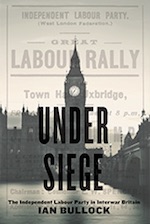Despite its decline, the Independent Labour Party preserved the values of democratic socialism during the interwar years, according to ILP historian Ian Bullock in his new book, due to be published in December by Athabasca University Press.
Under Siege: The Independent Labour Party in Interwar Britain explores the ideas that motivated the ILP during this tumultuous period. By combing through newspapers, leaflets and party documents, Bullock arrives at a detailed explanation of the most controversial and significant debates in and around the ILP. Some, such as the Living Wage policy, continue to bear contemporary relevance.
During the period between the two world wars, the ILP was the main voice of radical democratic socialism in Britain. Founded in 1893, it had, since 1906, operated under the aegis of the Labour Party.
As that party edged nearer to power following World War I, forming minority governments in 1924 and again in 1929, the ILP found its own identity under siege. On one side stood those who wanted the ILP to subordinate itself to an increasingly cautious and conventional Labour leadership; on the other stood those who felt that the ILP should throw its lot in with the Communist Party of Great Britain.
After the ILP disaffiliated from Labour in 1932 in order to pursue a new, ‘revolutionary’ policy, it was again torn, this time between those who wanted to merge with the Communists and those who saw the ILP as their more genuinely revolutionary and democratic rival.
At the opening of the 1930s, the ILP boasted five times the membership of the Communist Party, as well as a sizeable contingent of MPs. By the end of the decade, having tested the possibility of creating a revolutionary party in Britain almost to the point of its own destruction, the ILP was much diminished – although, unlike the Communists, it still retained a foothold in Parliament.
Despite this reversal of fortunes, during the 1930s – years that witnessed the ascendancy of both Stalin and Hitler – the ILP demonstrated an unswerving commitment to democratic socialist thinking.
Drawing extensively on the ILP’s Labour Leader and other contemporary left-wing newspapers, as well as on ILP publications and internal party documents, Bullock argues that the interwar ILP made a lasting contribution to British politics in general, and to the modern Labour Party in particular, by preserving the values of democratic socialism.
—-
To read more about Under Siege: The Independent Labour Party in Interwar Britain go to the AU Press website where a free PDF version will be available to download from December.
Readers in the UK can purchase the book through Combined Academic Publishers or other online vendors.
Click here to read more by Ian Bullock, including ‘Lessons of 1917 … And All That!’ and ‘The ILP and The Great War’.




26 November 2017
Fenner Brockway is one of the two people in the book I have met – in his case very briefly when he came to speak at a meeting in Brighton in the early 1980s. The other one is Don McGregor who I remember well from the previous decade when he would sometimes attend Voice of the Union board meetings. He was a dedicated ILPer – I was delighted when I came across something he’d written in the October 1939 edition of Between Ourselves – the then ILP internal discussion journal. I quote it towards the end of the book (p 295) it’s very typical of what I remember of him. He used to object vehemently if anyone used the term ‘democratic socialism’ on the grounds that if it wasn’t democratic there was no way it could be legitimately called socialism.
I do have to register a slight disagreement with Harry. I don’t see Gidon Cohen’s book as in any way in contrast to mine. It was reviewing it that got me interested in researching the interwar ILP. The main differences are that I deal with the pre-1932 years and concentrate more or less exclusively on the ideas & debates while Gidon has much to say about other aspects such as membership.
24 October 2017
Fenner Brockway claimed that he made two major political mistakes in his lfe. One was to actively support the disaffiliation of the ILP from the Labour Party just after Ramsay MacDonald and company had deserted Labour. The other was to accept a Peerage. I look forward with interest to Ian Bullock’s book. A work to contrast it with will be The Failure Of A Dream: The ILP from Disaffiliation to World War 2 by Gidon Cohen (Tauris Academic Studies, 2007).
The ILP was, of course, sidelined in the main period of Labour’s main achievements in the post-Second World War Labour government. Perhaps the associated shortcomings of that period would have been lessoned if they had still been affiliated.